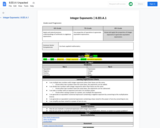
Know and apply the properties of integer exponents to generate equivalent expressions.
- Subject:
- Mathematics
- Material Type:
- Activity/Lab
- Author:
- Liberty Public Schools
- Date Added:
- 04/13/2021

Know and apply the properties of integer exponents to generate equivalent expressions.
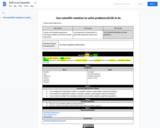
Perform operations with numbers expressed in scientific notation, including problems where both decimal and scientific notation are used.
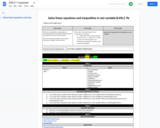
Solve linear equations and inequalities in one variable.
b. Solve linear equations and inequalities with rational number coefficients, including equations and inequalities whose solutions require expanding expressions using the distributive property and combining like terms. (guarantee limited to equations)

This is a task from the Illustrative Mathematics website that is one part of a complete illustration of the standard to which it is aligned. Each task has at least one solution and some commentary that addresses important asects of the task and its potential use. Here are the first few lines of the commentary for this task: It is said that the average person blinks about 1000 times an hour. This is an order-of-magnitude estimate, that is, it is an estimate given as a power...
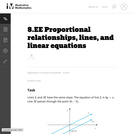
This is a task from the Illustrative Mathematics website that is one part of a complete illustration of the standard to which it is aligned. Each task has at least one solution and some commentary that addresses important asects of the task and its potential use. Here are the first few lines of the commentary for this task: Lines $L$ and $M$ have the same slope. The equation of line $L$ is $4y=x$. Line $M$ passes through the point $(0, -5)$. What is the equation of line $M...

This is a task from the Illustrative Mathematics website that is one part of a complete illustration of the standard to which it is aligned. Each task has at least one solution and some commentary that addresses important asects of the task and its potential use. Here are the first few lines of the commentary for this task: For a science project, Sammy observed a chipmunk and a squirrel stashing acorns in holes. The chipmunk hid 3 acorns in each of the holes it dug. The sq...
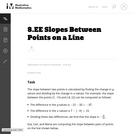
This is a task from the Illustrative Mathematics website that is one part of a complete illustration of the standard to which it is aligned. Each task has at least one solution and some commentary that addresses important asects of the task and its potential use. Here are the first few lines of the commentary for this task: The slope between two points is calculated by finding the change in $y$-values and dividing by the change in $x$-values. For example, the slope between...

This is a task from the Illustrative Mathematics website that is one part of a complete illustration of the standard to which it is aligned. Each task has at least one solution and some commentary that addresses important asects of the task and its potential use. Here are the first few lines of the commentary for this task: Anna and Jason have summer jobs stuffing envelopes for two different companies. Anna earns \$14 for every 400 envelops she finishes. Jason earns \$9 fo...

This is a task from the Illustrative Mathematics website that is one part of a complete illustration of the standard to which it is aligned. Each task has at least one solution and some commentary that addresses important asects of the task and its potential use. Here are the first few lines of the commentary for this task: The local swim center is making a special offer. They usually charge \$7 per day to swim at the pool. This month swimmers can pay an enrollment fee of ...

This is a task from the Illustrative Mathematics website that is one part of a complete illustration of the standard to which it is aligned. Each task has at least one solution and some commentary that addresses important asects of the task and its potential use. Here are the first few lines of the commentary for this task: Draw the two lines that intersect only at the point $(1,4)$. One of the lines should pass through the point $(0,-1)$. Write the equation of each of the...
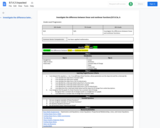
Investigate the difference between linear and nonlinear functions.
Interpret the equation y=mx+b as a defining a linear function, whose parameters are the slope (m) and the y-intercept (b).
Recognize that the graph of a linear function has a constant rate of change.

This is a task from the Illustrative Mathematics website that is one part of a complete illustration of the standard to which it is aligned. Each task has at least one solution and some commentary that addresses important asects of the task and its potential use. Here are the first few lines of the commentary for this task: Joshua's mail truck travels 14 miles every day he works, and is not used at all on days he does not work. At the end of his 100th day of work the mail ...

This is a task from the Illustrative Mathematics website that is one part of a complete illustration of the standard to which it is aligned. Each task has at least one solution and some commentary that addresses important asects of the task and its potential use. Here are the first few lines of the commentary for this task: Serena is starting a new workout routine and wants to keep track of her heart rate to make sure that she is exercising at the optimum level. First she ...

This is a task from the Illustrative Mathematics website that is one part of a complete illustration of the standard to which it is aligned. Each task has at least one solution and some commentary that addresses important aspects of the task and its potential use.

This is a task from the Illustrative Mathematics website that is one part of a complete illustration of the standard to which it is aligned. Each task has at least one solution and some commentary that addresses important asects of the task and its potential use. Here are the first few lines of the commentary for this task: During the 2005 Divisional Playoff game between The Denver Broncos and The New England Patriots, Bronco player Champ Bailey intercepted Tom Brady aroun...

This is a task from the Illustrative Mathematics website that is one part of a complete illustration of the standard to which it is aligned. Each task has at least one solution and some commentary that addresses important aspects of the task and its potential use.

This is a task from the Illustrative Mathematics website that is one part of a complete illustration of the standard to which it is aligned. Each task has at least one solution and some commentary that addresses important aspects of the task and its potential use.

This is a task from the Illustrative Mathematics website that is one part of a complete illustration of the standard to which it is aligned. Each task has at least one solution and some commentary that addresses important aspects of the task and its potential use.

This is a task from the Illustrative Mathematics website that is one part of a complete illustration of the standard to which it is aligned. Each task has at least one solution and some commentary that addresses important asects of the task and its potential use. Here are the first few lines of the commentary for this task: Given that $\overleftrightarrow{DE}\parallel\overleftrightarrow{AC}$ in the diagram below, prove that $a + b + c = 180.$ Explain why this result holds ...
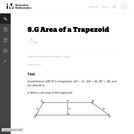
This is a task from the Illustrative Mathematics website that is one part of a complete illustration of the standard to which it is aligned. Each task has at least one solution and some commentary that addresses important asects of the task and its potential use. Here are the first few lines of the commentary for this task: Quadrilateral $ABCD$ is a trapezoid, $AD = 15$, $AB = 50$, $BC = 20$, and the altitude is 12. What is the area of the trapezoid?...